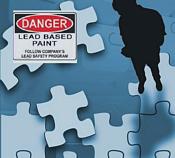Renovators And Their Trade Partners Will Need To Work Out And Agree On Who Will Do What
 Many contractors seeking to comply with the new EPA RRP rule are reporting concerns and challenges about finding trade partners who are willing to operate in compliance. Many renovators have told me that their trade partners have flat out refused to get their businesses and workers certified. Others have said their trade partners have committed to do so but have been slow to get it done due to the related costs. This has become quite an opportunity for some trade partners who have become certified and are marketing their certifications and services to general contractors. Several are actually offering to sub-contract the set-up, containment, demo, clean-up, cleaning verification and all related and required documentation for general contractors.
Many contractors seeking to comply with the new EPA RRP rule are reporting concerns and challenges about finding trade partners who are willing to operate in compliance. Many renovators have told me that their trade partners have flat out refused to get their businesses and workers certified. Others have said their trade partners have committed to do so but have been slow to get it done due to the related costs. This has become quite an opportunity for some trade partners who have become certified and are marketing their certifications and services to general contractors. Several are actually offering to sub-contract the set-up, containment, demo, clean-up, cleaning verification and all related and required documentation for general contractors.
A surprise to me, but also a no-brainer, was one electrician’s comment that he was having problems finding general contractors to work for who were in RRP compliance. Just as general contractors need to find new compliant trade partners to work for them, many trade partners are finding they can no longer rely on the volume of work they got in the past from contractors if those businesses choose to operate illegally.
Liability risks may also drive compliance. Renovators and their trade partners will need to work out and agree on who will do what. Here are a few examples:
-
 Who will take care of the notification requirements and documentation of same before the job begins? Under the rule, either can do so, but the business under contract with the property owner must maintain the required documentation.
Who will take care of the notification requirements and documentation of same before the job begins? Under the rule, either can do so, but the business under contract with the property owner must maintain the required documentation.
-
If a trade partner or his employees are not certified renovators, will the renovator take on the responsibility of training and supervising the trade partner and or his employees? If so, at what level of risk? And, will either business’s insurance company allow such a relationship in the future?
-
Who will create the required renovation checklist?
-
Who will make sure the homeowner and or tenant receives a copy of the required renovation checklist after completion of the work?
-
In Massachusetts, who will maintain the required log documenting who comes in and out of the containment area during the course of renovations?
 The first time a RRP fine is accessed for a violation the finger pointing will start, causing one or both businesses to get serious about certification and compliance. The first time a renovator is sued by a client or neighbor as a result of the actions of a trade partner, the tactics used by the lawyers will cause both businesses to have a new and different outlook on RRP compliance, insurance coverage amounts and indemnification clauses. Attorney Mike Sams of Kenney & Sams, P.C., told me that failure of a business to be properly certified under the RRP rule on its own is evidence of negligence should a homeowner or insurance company take the contractor or trade partner to court. Taking this a little further, a contractor hiring a non-certified trade partner might also be considered negligence if that trade partner is allowed to work unsupervised.
The first time a RRP fine is accessed for a violation the finger pointing will start, causing one or both businesses to get serious about certification and compliance. The first time a renovator is sued by a client or neighbor as a result of the actions of a trade partner, the tactics used by the lawyers will cause both businesses to have a new and different outlook on RRP compliance, insurance coverage amounts and indemnification clauses. Attorney Mike Sams of Kenney & Sams, P.C., told me that failure of a business to be properly certified under the RRP rule on its own is evidence of negligence should a homeowner or insurance company take the contractor or trade partner to court. Taking this a little further, a contractor hiring a non-certified trade partner might also be considered negligence if that trade partner is allowed to work unsupervised.
 To confuse matters even further, under their definition of the difference between an employee and an independent contractor, the IRS says that a contractor cannot supervise the work or workers of a sub contractor. Doing so might result in the IRS labeling the sub contractor as an employee. If this were to happen it could trigger addition payroll taxes and workers compensation costs for the general contractor.
To confuse matters even further, under their definition of the difference between an employee and an independent contractor, the IRS says that a contractor cannot supervise the work or workers of a sub contractor. Doing so might result in the IRS labeling the sub contractor as an employee. If this were to happen it could trigger addition payroll taxes and workers compensation costs for the general contractor.
Topics:
Effects of the RRP Rule,
Production Considerations,
Subcontractor Considerations,
Legal Considerations,
Shawn's Predictions,
Insurance Considerations,
Notification Considerations,
Compliance Options,
Documentation Considerations,
MA RRP Lead Rules,
Enforcement and Inspections
 Many contractors seeking to comply with the new EPA RRP rule are reporting concerns and challenges about finding trade partners who are willing to operate in compliance. Many renovators have told me that their trade partners have flat out refused to get their businesses and workers certified. Others have said their trade partners have committed to do so but have been slow to get it done due to the related costs. This has become quite an opportunity for some trade partners who have become certified and are marketing their certifications and services to general contractors. Several are actually offering to sub-contract the set-up, containment, demo, clean-up, cleaning verification and all related and required documentation for general contractors.
Many contractors seeking to comply with the new EPA RRP rule are reporting concerns and challenges about finding trade partners who are willing to operate in compliance. Many renovators have told me that their trade partners have flat out refused to get their businesses and workers certified. Others have said their trade partners have committed to do so but have been slow to get it done due to the related costs. This has become quite an opportunity for some trade partners who have become certified and are marketing their certifications and services to general contractors. Several are actually offering to sub-contract the set-up, containment, demo, clean-up, cleaning verification and all related and required documentation for general contractors. Who will take care of the notification requirements and documentation of same before the job begins? Under the rule, either can do so, but the business under contract with the property owner must maintain the required documentation.
Who will take care of the notification requirements and documentation of same before the job begins? Under the rule, either can do so, but the business under contract with the property owner must maintain the required documentation.
 Looking for accurate information about the EPA RRP rule?
Looking for accurate information about the EPA RRP rule?  The first time a RRP fine is accessed for a violation the finger pointing will start, causing one or both businesses to get serious about certification and compliance. The first time a renovator is sued by a client or neighbor as a result of the actions of a trade partner, the tactics used by the lawyers will cause both businesses to have a new and different outlook on RRP compliance, insurance coverage amounts and indemnification clauses.
The first time a RRP fine is accessed for a violation the finger pointing will start, causing one or both businesses to get serious about certification and compliance. The first time a renovator is sued by a client or neighbor as a result of the actions of a trade partner, the tactics used by the lawyers will cause both businesses to have a new and different outlook on RRP compliance, insurance coverage amounts and indemnification clauses.  To confuse matters even further, under their definition of the difference between an employee and an independent contractor, the IRS says that a contractor cannot supervise the work or workers of a sub contractor. Doing so might result in the IRS labeling the sub contractor as an employee. If this were to happen it could trigger addition payroll taxes and workers compensation costs for the general contractor.
To confuse matters even further, under their definition of the difference between an employee and an independent contractor, the IRS says that a contractor cannot supervise the work or workers of a sub contractor. Doing so might result in the IRS labeling the sub contractor as an employee. If this were to happen it could trigger addition payroll taxes and workers compensation costs for the general contractor.


